Executive Summary
Business Overview
MeadowRidge Wedding Grounds is a seasonal wedding venue on a rural property in Franklin, Tennessee. It offers outdoor space for ceremonies and limited indoor use in an existing barn. Only part of the property is used for events, and no land purchase is required.
The business is owned and managed by Sarah Mitchell. She handles all management decisions and daily operations. This is her first wedding venue, but she has experience managing rural land and planning private events.
The venue operates under a dry hire (also known as an open vendor) model, where MeadowRidge provides the event space only and does not offer catering, alcohol service, or full event planning. Couples work with licensed third-party vendors of their choice.
Location and Facility
MeadowRidge Wedding Grounds is at 18420 County Road 47 in Franklin, Tennessee, about 45 to 60 minutes from Nashville. The property has open rural land and a barn. The barn will be used for weddings and small events with basic lighting and power.
No major construction is planned. We’re putting in lighting, power, restrooms, parking, and safety equipment. Parking is on-site in a gravel area. Space is based on approved guest limits. Entry and exit paths are marked to manage traffic during events.
Operations
MeadowRidge operates as a seasonal, single-event wedding location on a privately owned rural property. It’s used to organize wedding ceremonies and receptions, and most weddings have 75 to 150 people.
At MeadowRidge, we don’t provide food or alcohol. So, couples need to hire their own caterers and bartenders or other third-party vendors. All vendors must have proper insurance and required permits. They also must follow basic safety rules.
The venue operates from April through October. Only one wedding is booked per date, with no overlapping events.
Financials
MeadowRidge is seeking $325,000 to get started. That includes a $292,500 SBA loan from Regions Bank and $32,500 from the owner. The fund goes toward parking, access roads, electrical work, lighting, restrooms, permits, insurance, early advertising, and cash to cover bills while getting started.
All revenue comes from wedding bookings. We plan to host 14 weddings in the first year, 18 in the second year, and 22 in the third year. Our main expenses include event staff, utilities, insurance, marketing, and loan payments. Operating only during the wedding season and booking one wedding per day helps keep costs under control.
A business plan shouldn’t take weeks
Company Overview
MeadowRidge Wedding Grounds is a single-member LLC registered in Tennessee. It’s a seasonal wedding venue that offers outdoor space for ceremonies and limited use of an existing barn, with only a specific part of the property used for wedding events.
The land is owned by the founder personally. It is not part of the business purchase and is not used as collateral for the loan. The venue has the required approvals to host events, and the property remains separate from the LLC.
MeadowRidge Wedding Grounds follows a dry hire (open vendor) venue model. The business rents the property for weddings and events only and does not provide food, alcohol, décor, or full-service planning. This structure reduces operational risk, lowers fixed costs, and allows couples flexibility in selecting licensed vendors that meet venue rules and local requirements.
Ownership
MeadowRidge Wedding Grounds is owned and operated by a single owner. The founder handles all management decisions.
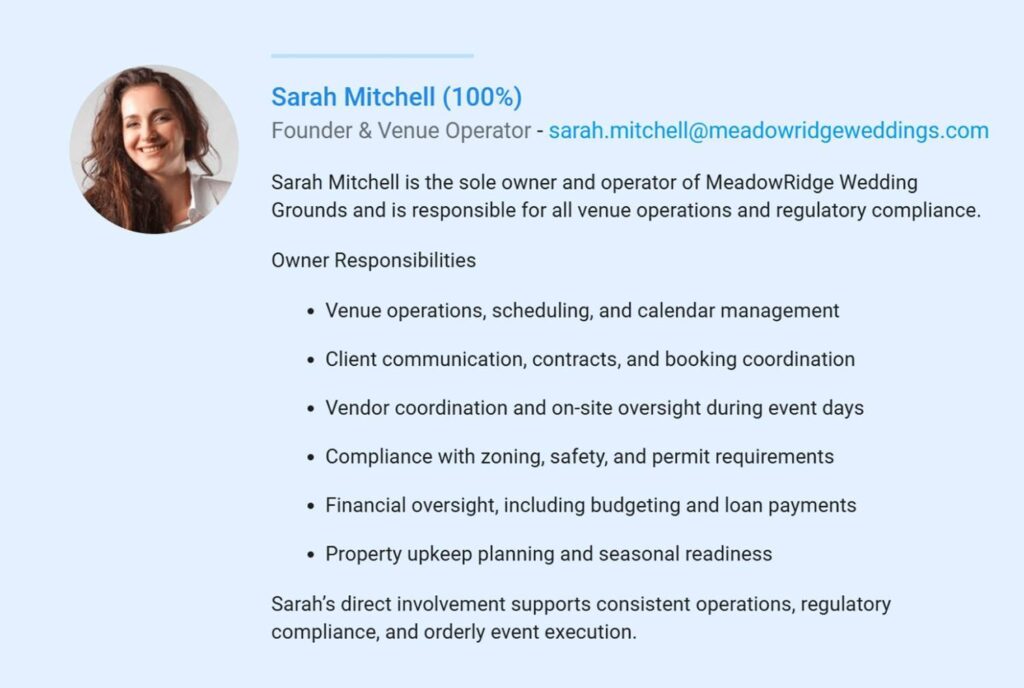
Start-Up Summary
We, at MeadowRidge, require $325,000 to initiate the operations. It comprises a $292,500 SBA loan and a $32,500 owner contribution. The funds are allocated for site prep, parking areas, access roads, lights, electrical work, bathrooms, permits, some initial marketing, and working capital.
This financing structure facilitates a controlled, low-risk launch. It allows the venue to have a few seasonal bookings at the start while still maintaining a low level of early expenses.
The detailed allocation of startup funds is presented in the table below.
Startup Cost Breakdown:
| Category | Cost | Description |
|---|---|---|
| Site Grading, Access & Parking | $50,000 | Gravel parking, signage, and access improvements |
| Power, Lighting & Infrastructure | $45,000 | Electrical service, lighting, and basic sound accommodations |
| Restroom Facilities | $40,000 | Permanent or high-end modular restroom units |
| Barn / Covered Space Upgrades | $70,000 | Improvements to the existing barn or pavilion structure |
| Permits, Zoning & Inspections | $15,000 | Local approvals, inspections, and compliance costs |
| Insurance, Legal & Professional Fees | $10,000 | Business insurance, legal setup, and advisory services |
| Initial Marketing & Booking Launch | $15,000 | Listings, visual content, and early booking promotion |
| Working Capital Reserve | $80,000 | Operating cushion for staffing, utilities, and contingencies |
| Total Startup Capital | $325,000 | $292,500 SBA loan + $32,500 owner equity |
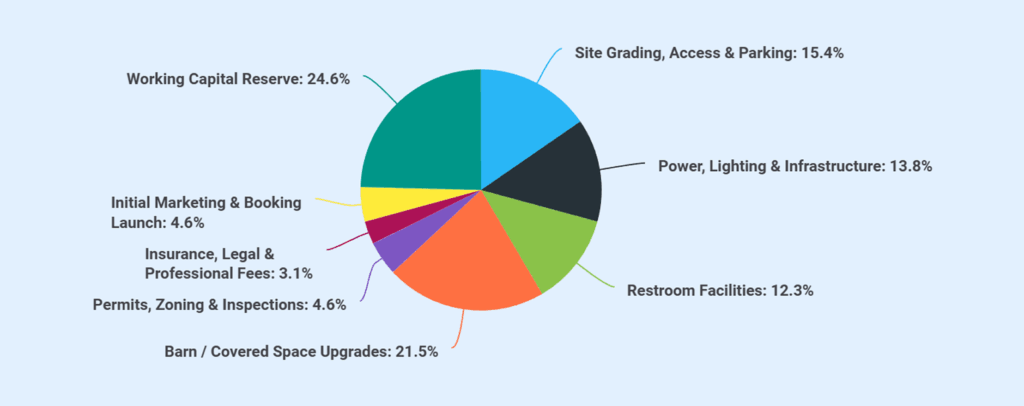
Business Goals
Here’s what we aim to achieve:
- Establish MeadowRidge Wedding Grounds as a compliant and reliable seasonal venue in the Franklin area within the first operating year, with all zoning, safety, and permit requirements fully met and maintained.
- Achieve steady seasonal bookings by Year 2 that cover fixed operating costs and annual loan payments. This allows the business to operate without relying on additional owner funding.
- Build a repeat and referral-driven booking base through planners, vendors, and past couples. This will help us reduce reliance on paid marketing over time.
- Increase the number of booked events gradually while keeping fixed costs stable and ensuring growth does not compromise site control or operating margins.
- Maintain controlled guest counts and event flow at every booking, protecting the property, preserving neighbor relations, and supporting consistent event quality.
These goals help support steady bookings, cost control, and long-term business stability.

Does your plan sound generic?
Refine your plan to adopt to investor/lender interests
Market Analysis
Local Market – Franklin, TN Wedding Industry
MeadowRidge Wedding Grounds serves couples in Franklin, Tennessee, and nearby areas within driving distance of Nashville. Franklin is commonly used for weddings due to its rural setting and proximity to the city.
In 2025, Franklin recorded about 275 weddings, with total wedding spending of approximately $6.27 million. Local weddings are typically mid-size, with average guest counts between 105 and 115 people. Venues that accommodate 75 to 150 guests meet a significant share of local demand.
MeadowRidge Wedding Grounds is designed for this market by offering a rural venue suited to mid-size weddings and accessible to couples traveling from Nashville and surrounding communities.
U.S. Wedding Industry Overview
The U.S. wedding services market was valued at $64.93 billion in 2024 and is projected to grow at a CAGR of 6.8% from 2025 to 2030. Growth is driven by couples spending more on venues, planning, and personalized experiences.
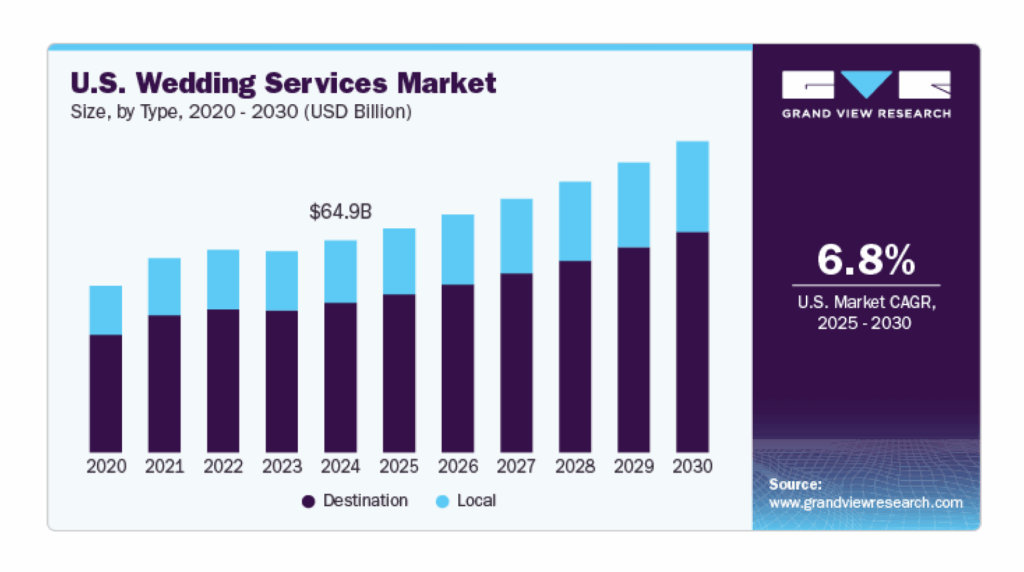
With the increasing diversity of the U. S. population, multicultural and interfaith weddings have been on the rise, both of which typically entail the need for venues to be flexible and events to be customized. These trends justify the demand for small, flexible, and aesthetically pleasing venues such as MeadowRidge Wedding Grounds.
Social media also affects venue choice. Couples prefer places that look good in photos. MeadowRidge Wedding Grounds fits this trend by offering a private rural location and a simple event setup.
Market Segmentation
We, at MeadowRidge Wedding Grounds, focus on four specific groups. We look at their budget, guest count, and what kind of venue they like.
Local and Regional Couples (Primary Segment) – 60%
These couples live in or near Nashville. They want a country wedding spot that is close to home. This group makes up the biggest part of our bookings.
Destination-Adjacent Weddings – 20%
These couples come from nearby states. They love the rural Tennessee look. However, they still need a location that is easy for their guests to get to.
Mid-Size Wedding Events (75–150 Guests) – 15%
These weddings are too big for a backyard. They need more privacy and space. But they do not want a giant, busy commercial hall.
Non-Traditional or Second Marriages – 5%
These are smaller, simple weddings. They care more about a beautiful, quiet setting than having a massive, fancy event.

This segmentation allows MeadowRidge to focus marketing and pricing on weddings that fit capacity limits and operational controls.
Target Customer Profile
MeadowRidge Wedding Grounds serves couples seeking a private, mid-size outdoor wedding in a quiet setting away from the city.
| Category | Description |
|---|---|
| Primary audience | Couples planning a mid-size wedding in a quiet, rural setting |
| Age range | 25 to 40 years |
| Guest count | 75 to 150 guests |
| Location of couples | Nashville and nearby towns in Williamson County |
| Venue preference | Outdoor setting away from the city |
| Key priority | Full private use of the venue for the entire day |
| Price fit | Mid-size, non-luxury wedding budgets |
Local Trends
Several local trends support MeadowRidge Wedding Grounds:
- Franklin and nearby parts of Williamson County attract couples looking for rural wedding venues outside Nashville. The city has limited outdoor wedding space.
- Most local weddings are mid-sized. This creates steady demand for venues that hold 75 to 150 guests. Couples want something smaller than large banquet halls.
- Many couples in the Nashville area want venues that offer private, full-day use. They prefer not to share the space or have back-to-back events.
- Outdoor ceremonies with simple setups are becoming more popular. Couples choose countryside venues with natural scenery. These require less decoration.
Competitive Analysis
Key Competitors
MeadowRidge Wedding Grounds operates in a competitive regional wedding venue market that includes large outdoor estates and traditional indoor event spaces. Rather than competing with high-capacity or full-service venues, MeadowRidge focuses on mid-size outdoor weddings that value privacy, simplicity, and a one-event-per-day format.
| Competitor | Location | Who They Serve | What They Are Known For | Type |
|---|---|---|---|---|
| The Barn at Sycamore Farms | Franklin, TN | Large rural weddings | Well-known venue with space for big events | Direct |
| Mint Springs Farm | Nolensville, TN | Destination-style weddings | Scenic property with many features | Direct |
| Indoor Banquet Halls | Near Franklin | Indoor weddings | Set packages and indoor space | Indirect |
| Hotel Ballrooms | Nashville and nearby cities | Full-service weddings | Hotel space with event services | Indirect |
| Country Clubs | Urban and suburban areas | Traditional weddings | Formal setting and private grounds | Indirect |
MeadowRidge Wedding Grounds competes effectively by serving couples who want a private, outdoor wedding without the scale or complexity of large venues.
The one-event-per-day model supports a calm guest experience, controlled operations, and predictable costs. This allows the business to operate reliably within a focused market segment.
SWOT Analysis
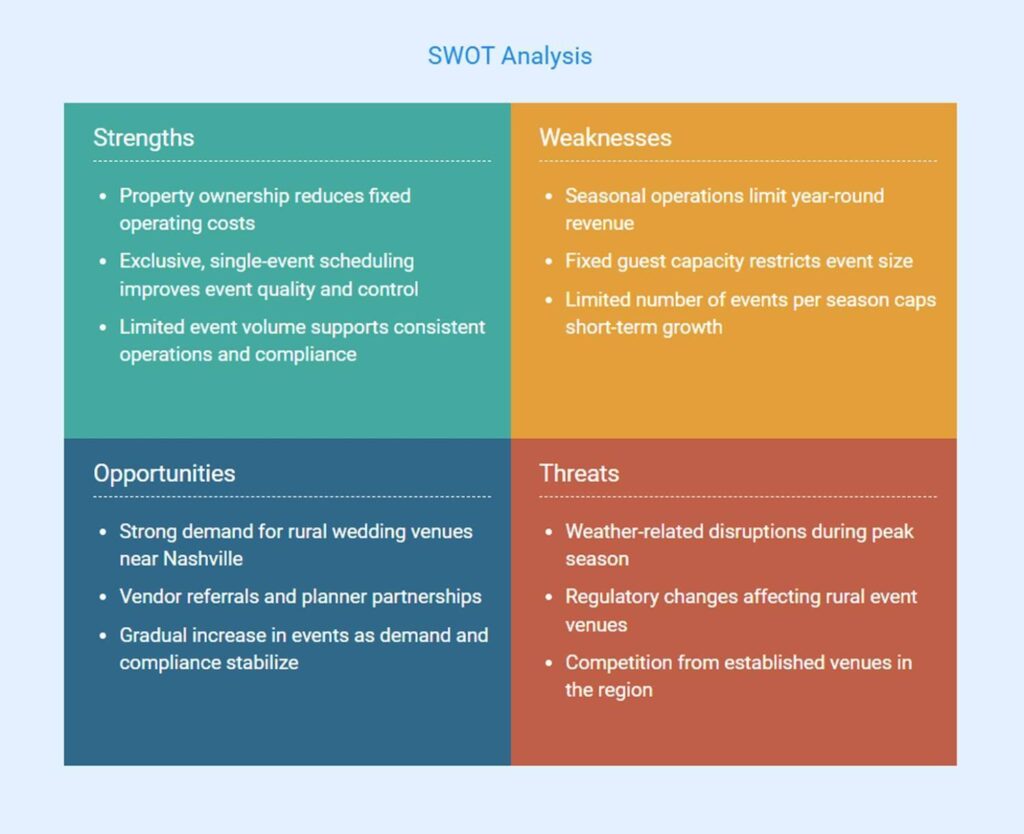
Service Offerings
MeadowRidge Wedding Grounds offers seasonal wedding ceremony and reception rentals in a rural setting. The venue provides private access to the property and operates within approved guest limits.
The venue is rented for one full day at a time. Only one wedding is hosted per day, and no other events take place on the same date. Operations run from April through October, which aligns with the local wedding season and keeps operations manageable.
Primary Service: Base Venue Rental
The primary service is a full-day venue rental for a wedding ceremony and reception. Each booking includes exclusive use of the property for the entire event day.
The average venue rental fee is $7,000 per wedding, based on comparable rural wedding venues in the surrounding area. Pricing may vary slightly by season and event date.
The venue does not provide catering or alcohol service. Couples must work with licensed third-party vendors.
Optional Add-On Services
| Add-On Service | Price | Description |
|---|---|---|
| Extended Access Hours | $500–$1,000 per event | Extra time before or after normal event hours |
| Rehearsal Access | $200–$400 per use | Property access for ceremony rehearsal |
| Basic Ceremony Setup | $300–$600 per event | Basic setup for ceremony seating and layout |
Vendor & Service Partners
MeadowRidge Wedding Grounds is not a direct provider of catering, alcohol service, decor, or full-service event planning. Food, beverage, entertainment, and rental services are all the work of third-party vendors who are licensed and selected by the client.
This kind of operating model lowers the venue’s risk, reduces the fixed costs, and gives the owner an opportunity to concentrate on property management and the event rather than service delivery.
To keep events running smoothly and meeting the same standards, we maintain a preferred vendor list. Couples, however, are free to choose their own vendors. All vendors must be properly licensed and insured.
They must also follow venue rules for arrival times, setup and breakdown, parking use, and noise limits. This approach helps events run smoothly while keeping the venue compliant and allowing staff to maintain control over daily operations, planning, timing, and overall event flow on site.
Marketing and Sales Strategy
MeadowRidge Wedding Grounds uses a simple and personal way to reach couples and book dates early. The focus is on trusted wedding websites, referrals from vendors, and direct contact with the owner, not mass promotion.
Marketing Channels
MeadowRidge Wedding Grounds uses a mix of online platforms as well as referrals to reach couples who are ready to book. Here’s the breakdown.
| Channel | Use | Purpose |
|---|---|---|
| The Knot & WeddingWire | Venue listings and reviews | Capture high-intent wedding venue searches |
| Property and event visuals | Build awareness and credibility | |
| Vendor Referrals | Planners, photographers, florists | Generate trusted, repeat inquiries |
| Local Bridal Shows | In-person exposure | Direct engagement with engaged couples |
| Website Platform (Inquiry Management) | Venue information and contact | Support site visits and bookings |
This channel mix supports early discovery, advance planning, and consistent lead flow throughout the booking cycle.
Sales Strategy
MeadowRidge Wedding Grounds receives requests from online listings, the venue website, and referrals from planners and vendors. Each request is checked for the event date, guest size, and venue rules. This includes the one-event-per-day rule and the April to October season.
If the request fits, a site visit is set up. Couples tour the property and see the ceremony and reception areas. Details are discussed during the visit. And booking terms are shared afterwards. A date is confirmed only after the contract is signed and the deposit is paid. This helps keep the schedule clear and avoids double bookings.
Customer Acquisition Plan
MeadowRidge Wedding Grounds attracts clients by focusing on channels where couples actively search for venues and rely on trusted referrals.
| Year | Strategy | Goal |
|---|---|---|
| Year 1 | Online listings and local referrals | Establish baseline bookings |
| Year 2 | Planner and vendor partnerships | Increase repeat referrals |
| Year 3 | Brand recognition and past-client referrals | Maintain consistent seasonal bookings |

Don’t spend weeks on your first draft
Complete your business plan in less than an hour
Operations
MeadowRidge Wedding Grounds is run directly by Sarah Mitchell using simple systems. She handles all daily operations without full-time staff. This keeps costs low and helps maintain consistent events, guest experience, vendor coordination, and property care.
The venue allows only one event per day and operates only during the approved wedding season to stay organized, follow rules, and maintain quality.
Operation Hours
| Category | Working Days | Working Time |
|---|---|---|
| Administrative & Booking Communication | Monday to Friday | 9:00 AM – 5:00 PM |
| Site Visits & Venue Tours | Tuesday to Saturday | 10:00 AM – 6:00 PM |
| Event Days (Weddings) | Scheduled Dates (Apr–Oct) | Event-based hours per contract |
| Maintenance & Grounds Work | As needed | Daytime hours |
| Emergency Response | All days | Available during events |
Property Use & Improvement Plan
MeadowRidge Wedding Grounds operates on a privately owned rural property in Franklin, Tennessee. Only a specific part of the land is used for wedding events. No land purchase is required.
The property has an open outdoor space and an existing barn. The barn is used for limited event use. The goal is to make the space safe, approved, and comfortable for guests, not to rebuild or expand the property.
Planned improvements focus on site access, utilities, lighting, and guest facilities. While some permanent installations are included, no major structural changes or building expansions are planned. All work complies with local zoning and permit requirements.
The venue provides reasonable accessibility accommodations in compliance with the Americans with Disabilities Act (ADA). Accessible parking spaces, restroom access, and defined pathways are included in site planning. Any temporary or permanent facilities used during events meet applicable accessibility requirements.
Fire safety requirements are addressed based on approved occupancy levels. For events hosting up to 150 guests, compliance may include monitored fire protection systems, emergency lighting, and clearly marked egress paths, as required by the local Fire Marshal.
Improvements are completed in phases. All required upgrades are finished before the first wedding season. Any future upgrades are considered only after bookings become steady.
Daily Operations
Daily work at MeadowRidge Wedding Grounds focuses on booking events and keeping the property ready. The owner reviews new requests, confirmed bookings, deposits, and the event schedule each day. Direct communication with couples, planners, and vendors helps confirm event details, timing, and setup needs, including vendor arrival times and insurance documents.
Before each event, the property is inspected to ensure parking areas, ceremony spaces, restrooms, lighting, and walkways are clean and safe. All bookings, inspections, maintenance tasks, and event notes are recorded.
Booking Policies and Payments
At MeadowRidge Wedding Grounds, we use clear booking and payment rules to confirm dates and manage the schedule.
- Couples pay a 30% deposit at the time of contract signing to reserve a date.
- The deposit is not refundable and keeps the date reserved on the calendar.
- The remaining balance is paid before the wedding. The final payment must be made before the event date.
- Most dates are booked 12 to 18 months in advance, based on the season and open dates.
- Weddings are not booked on the same day or back-to-back.
Moreover, if a wedding is canceled, the deposit is not returned. Any other payments follow the cancellation terms in the contract. Also, rescheduling may be allowed within the same season and year if another date is available and an administrative fee is paid.
Overall, these guidelines help keep scheduling clear, protect booked dates, and reduce last-minute changes.
Technology and Systems
MeadowRidge Wedding Grounds uses advanced digital tools to manage operations and maintain records.
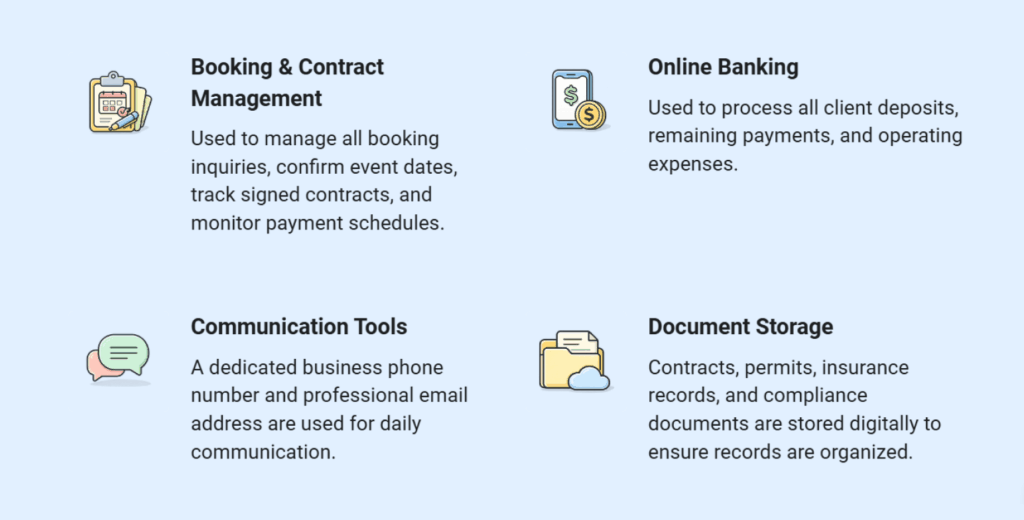
Licensing and Permits
MeadowRidge Wedding Grounds operates in compliance with all local and county regulations in Tennessee.
| Area | Description |
|---|---|
| Business Registration | MeadowRidge Wedding Grounds is registered as a Tennessee single-member LLC with the Tennessee Secretary of State. |
| Zoning and Event Use Approval | Event use approval is obtained from Williamson County through a Conditional Use Permit (CUP) or Special Use Permit (SUP), as required for operating a seasonal wedding venue on rural property. All zoning conditions are met prior to hosting events. |
| Permits and Inspections | Required building, electrical, restroom, and site permits are secured. All inspections are completed and approved before hosting events. |
| Insurance Requirements | General liability insurance is maintained for the venue. Clients and vendors are required to carry event insurance. |
| Safety and Compliance Standards | The venue meets fire safety, parking, lighting, and guest capacity rules. Noise limits and event hours are enforced. |
Noise Mitigation and Event Controls
MeadowRidge enforces a defined noise management plan consistent with rural zoning standards. Music and amplified sound are limited to approved hours, with a standard music cutoff time of 10:00 PM. Guest arrival, departure, and vendor breakdown schedules are managed to minimize disruption to neighboring properties.
Milestones & Timeline
MeadowRidge is operated via a progressive conversion and growth plan that aims at placing a greater emphasis on compliance, controlled rollout, and business stability. The following are several milestones that we’ve set:
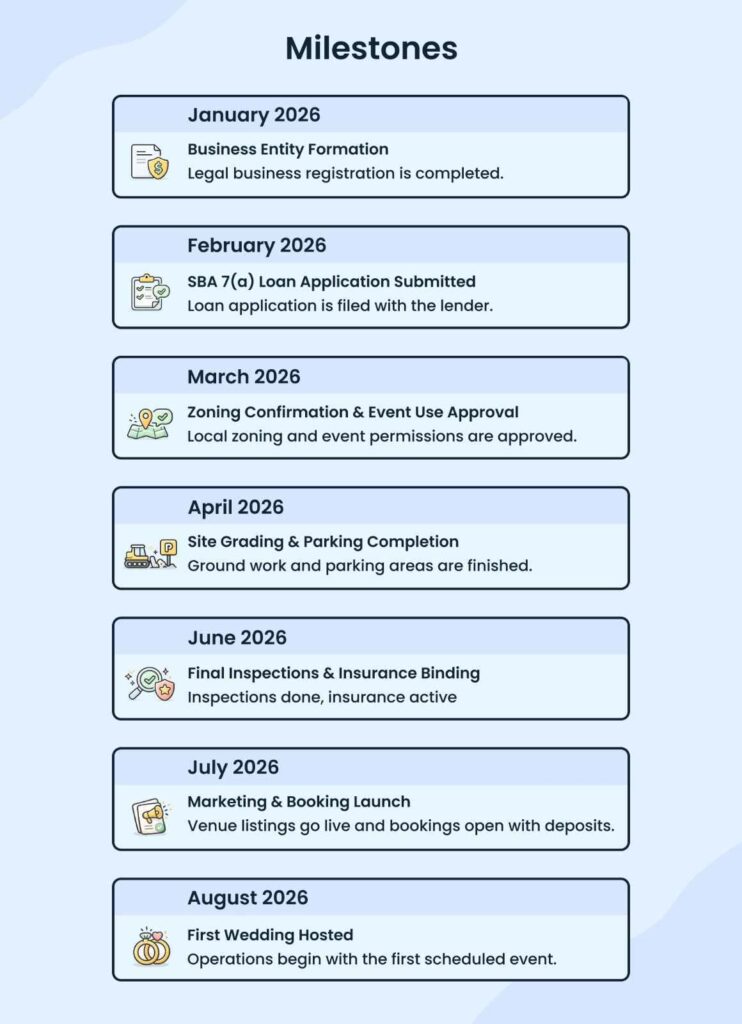
The timeline ensures the venue will open only after all required approvals and site work are finished.

Does your plan sound generic?
Refine your plan to adopt to investor/lender interests
Management and Staffing
MeadowRidge Wedding Grounds operates as an owner-managed business led by Sarah Mitchell. She has hands-on experience managing rural land and hosting private events on this same property before turning it into a venue. Her background includes setting up sites, managing guest flow, working with vendors, and keeping the property maintained for family and community gatherings. This gives her real experience running events in a country setting.
She handles bookings, permits, compliance paperwork, and on-site management during weddings. In the early stages, she’s not taking a salary. This keeps costs down and ensures she stays closely involved in daily operations.
The additional employees are hired just in time during events. Staffing is maintained flexibly and according to the event schedules to suit the seasonal needs.
Staffing Structure
MeadowRidge Wedding Grounds functions under a minimalist staff model that is event-based, and thus, labor costs are directly linked to bookings.
| Position | Role | Compensation | Notes |
|---|---|---|---|
| Event Coordinator | Contract (per event) | $600 per event | Day-of coordination and timeline management |
| Setup & Teardown Crew | Contract (per event) | ~$700 per event | Event setup, breakdown, and site reset |
| Grounds & Maintenance Support | Seasonal contract | $6,000 annually | Property upkeep during operating season |
This staffing approach keeps payroll costs low and helps control expenses. It allows the business to grow without hiring full-time staff too early.
Financial Plan
The financial plan for MeadowRidge Wedding Grounds LLC reflects a conservative, seasonal operating model with limited event volume, controlled capacity, and low fixed overhead. All revenues come from wedding venue rentals. Any add-on services are included in the average rental price and are not counted separately.
Funding Structure and Loan Repayment
At MeadowRidge Wedding Grounds, we’re seeking $325,000 in startup capital. Our source of funds will be a $292,500 SBA 7(a) loan and $32,500 in owner equity.
These funds will be used for site preparation, infrastructure upgrades, permits, insurance, early marketing, and working capital. As well, it will support cash flow during the first season.
Annual debt service totals approximately $46,800, consisting of interest and principal. Interest is reflected in operating expenses, while principal repayment is shown in financing cash flows.
During the first operating season, any shortfall in loan coverage is supported by the working capital reserve and the owner’s external income while bookings build toward stable levels.
| Item | Amount |
|---|---|
| Loan Type | SBA 7(a) Term Loan |
| Loan Amount | $292,500 |
| Annual Loan Payment | $46,800 |
| Payment Frequency | Annual |
| Repayment Source | Operating cash flow |
| Backup Coverage | Working capital reserve |
Revenue Forecast
Revenue is generated entirely from wedding venue rentals. Optional add-ons are included within average pricing assumptions and are not treated as separate revenue streams.
Key Assumptions:
- Average venue fee: $7,000 per wedding
- Events hosted: 14 (Year 1), 18 (Year 2), 22 (Year 3)
- One event per day, April–October season
| Category | Year 1 ($) | Year 2 ($) | Year 3 ($) |
|---|---|---|---|
| Wedding Venue Rentals | 98,000 | 126,000 | 154,000 |
| Total Revenue | 98,000 | 126,000 | 154,000 |
Profit & Loss Statement
Wedding venues are service-based businesses with no traditional cost of goods sold. All expenses are treated as operating expenses.
| Category | Year 1 ($) | Year 2 ($) | Year 3 ($) |
|---|---|---|---|
| Revenue | 98,000 | 126,000 | 154,000 |
| Cost of Goods Sold | 0 | 0 | 0 |
| Gross Profit | 98,000 | 126,000 | 154,000 |
| Staffing and Contractors | 24,200 | 29,400 | 34,600 |
| Utilities, Grounds, Maintenance | 14,000 | 14,500 | 15,000 |
| Insurance | 8,500 | 8,800 | 9,100 |
| Marketing and Booking Platforms | 9,000 | 9,500 | 10,000 |
| Interest Expense | 21,900 | 20,100 | 18,100 |
| Miscellaneous and Contingency | 7,500 | 7,500 | 7,500 |
| Cash Operating Expenses | 85,100 | 89,800 | 94,300 |
| Depreciation | 19,500 | 19,500 | 19,500 |
| Total Expenses | 104,600 | 109,300 | 113,800 |
| Pre-Tax Profit (Loss) | -6,600 | 16,700 | 40,200 |
| Income Tax | 0 | 3,674 | 8,844 |
| Net Profit (Loss) | -6,600 | 13,026 | 31,356 |
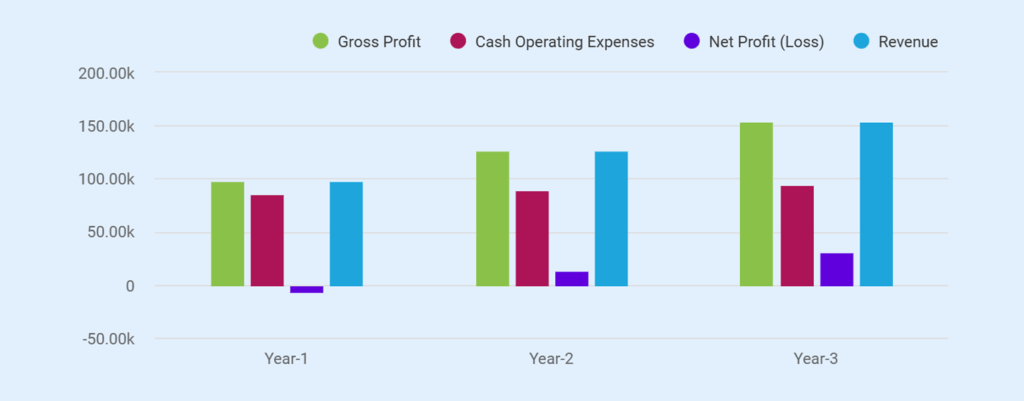
Cash Flow Projection (Year 1–3)
| Cash Flow Category | Year 1 ($) | Year 2 ($) | Year 3 ($) |
|---|---|---|---|
| Operating Cash Inflows | 98,000 | 126,000 | 154,000 |
| Operating Expenses (cash) | -85,100 | -89,800 | -94,300 |
| Income Taxes Paid | 0 | -3,674 | -8,844 |
| Net Operating Cash Flow | 12,900 | 32,526 | 50,856 |
| SBA Principal Repayment | -24,900 | -26,700 | -28,700 |
| Net Cash Flow | -12,000 | 5,826 | 22,156 |
| Beginning Cash Balance | 27,000 | 15,000 | 20,826 |
| Ending Cash Balance | 15,000 | 20,826 | 42,982 |
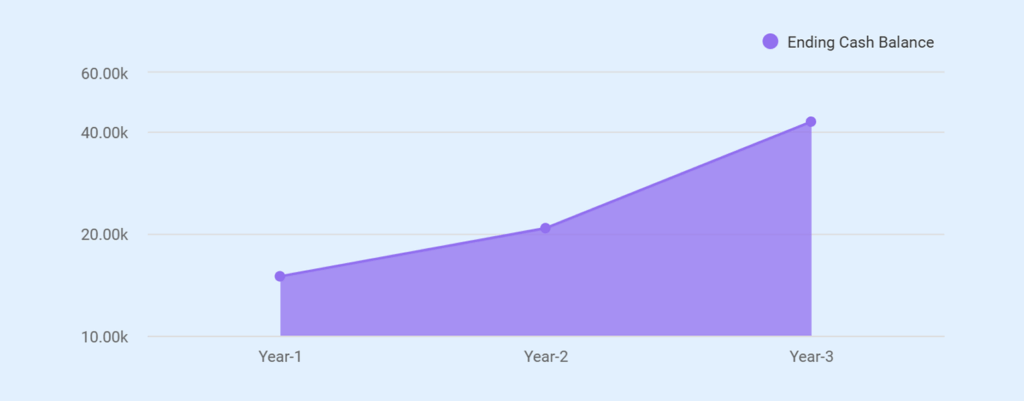
*Working capital reserve at startup is $80,000. Approximately $53,000 is used for pre-opening permits, insurance, deposits, inspections, and early marketing, leaving $27,000 as opening operating cash.
Balance Sheet
| Category | Year 1 ($) | Year 2 ($) | Year 3 ($) |
|---|---|---|---|
| Assets | |||
| Cash and Cash Equivalents | 15,000 | 20,826 | 42,982 |
| Venue Improvements (net) | 272,500 | 253,000 | 233,500 |
| Total Assets | 287,500 | 273,826 | 276,482 |
| Liabilities | |||
| SBA Loan Balance | 267,600 | 240,900 | 212,200 |
| Total Liabilities | 267,600 | 240,900 | 212,200 |
| Equity | |||
| Owner Capital | 32,500 | 32,500 | 32,500 |
| Retained Earnings | -12,600 | 426 | 31,782 |
| Total Equity | 19,900 | 32,926 | 64,282 |
| Total Liabilities + Equity | 287,500 | 273,826 | 276,482 |
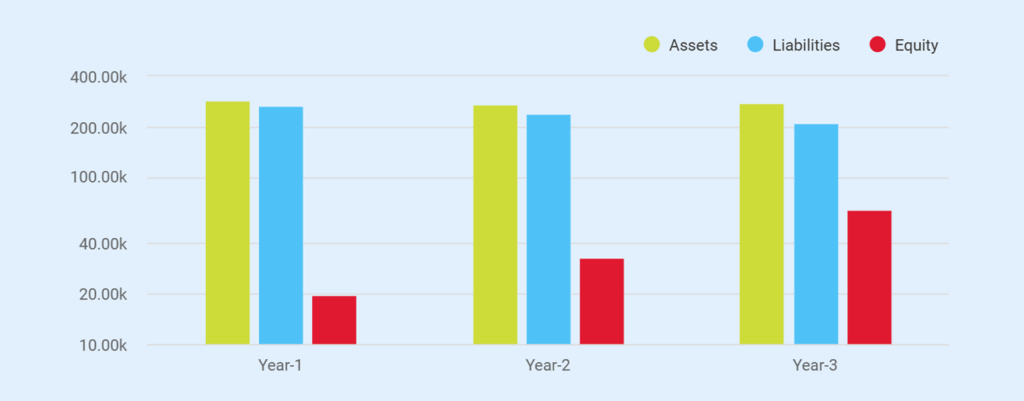
Retained earnings track cumulative net profit:
- Year 1: –6,600 operating loss + pre-opening expense impact = –12,600
- Year 2 and Year 3 roll forward correctly.
Break-Even Analysis
| Item | Amount |
|---|---|
| Fixed Annual Operating Costs | $96,500 |
| Average Revenue per Wedding | $7,000 |
| Break-even Weddings | $96,500 ÷ $7,000 = 13.8, rounded to 14 events |
Cash flow break-even is achieved at approximately 14 weddings per season, which aligns with Year 1 booking levels. Profitability break-even is reached in Year 2 as fixed costs are spread across a higher number of events.
Financial Strength and Debt Position
MeadowRidge Wedding Grounds operates with a conservative capital structure supported by owner-owned property, controlled event volume, and predictable booking behavior. The SBA 7(a) loan is fully amortizing with no interest-only period. Advance deposits and staged payments reduce cash flow volatility and support reliable debt service.
This financial model aligns with SBA underwriting standards for seasonal, property-backed event venues and demonstrates capacity for repayment under conservative assumptions.
Key Operating Risks and Controls
Running a seasonal wedding venue on rural property involves a few operational risks. MeadowRidge Wedding Grounds focuses on planning ahead, keeping events controlled, and following local rules to reduce issues and keep operations stable.
Weather Conditions
Most events are held outdoors, so the weather can affect ceremonies. The existing barn is used as a backup space when needed. If rain or high winds are forecast, the ceremony is moved indoors while the reception layout is adjusted accordingly. These weather plans are discussed with couples during booking. So, expectations are clear in advance.
Seasonal Revenue
MeadowRidge earns income only during the wedding season, which affects cash flow. To manage this, we collect a 30% non-refundable deposit, schedule remaining payments before event dates, and keep a cash reserve to cover off-season costs.
The Quickest Way to turn a Business Idea into a Business Plan
Fill-in-the-blanks and automatic financials make it easy.



